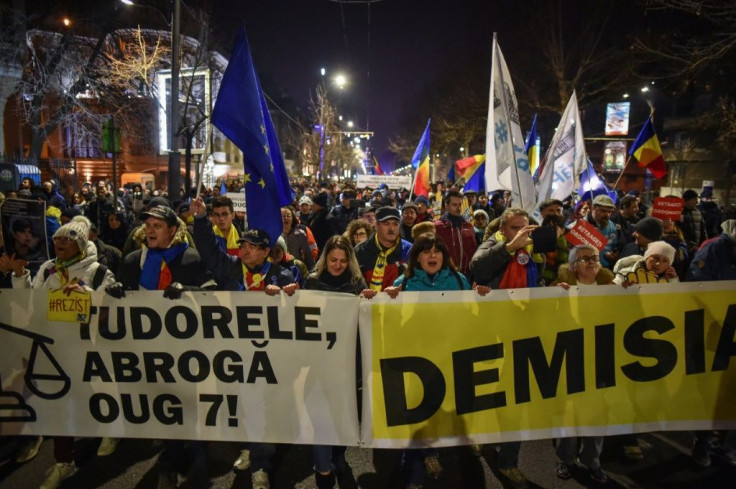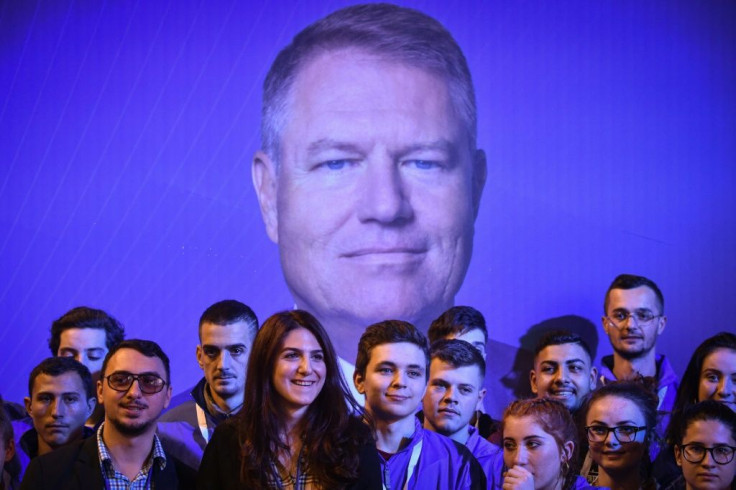Romania Set To Reaffirm Pro-EU Stance In Presidential Vote

When Romanians vote in the presidential elections starting Sunday, they are widely expected to reaffirm their pro-EU stance at a time when the European project finds itself under increasing attack from nationalistic sentiment in some of its members.
Romania, which joined the EU in 2007, was the last of the eastern European countries to shake off the shackles of communism.
And while it remains one of its poorest nations, most of the population recognise the advantages of being part of the 28-member bloc.
The current president, Klaus Iohannis -- a staunch pro-European from the centre-right -- is running for a second term and is widely expected to come out top again.
The vote takes place in two rounds -- the first on Sunday, followed by a second on November 24.
A former physics professor from Romania's German-speaking minority, the 60-year-old Iohannis sees eye-to-eye with Berlin and Paris on most issues, sometimes to the irritation of the leaders in nearby Budapest and Warsaw.
The main question on Sunday is who will be picked to run against him.
His main rivals are former Social Democrat (PSD) prime minister Viorica Dancila, recently deposed by parliament; Dan Barna, head of the newly formed pro-European party Union Save Romania (USR); or a former actor, Mircea Diaconu.

For the first time since the fall of communism 30 years ago, there is no guarantee that the PSD -- the direct successor of the former communist party -- will make it to the second round.
With its centralised structure and highly developed presence across the entire country, the PSD has ruled Romania for most of the time since the bloody revolution of December 1989.
But in recent years, it has run into trouble.
In 2015, a PSD-led government collapsed in the wake of protests over a Bucharest nightclub fire that killed 63 people.
Re-elected in late 2016 thanks to its older and rural electoral base, the PSD was quickly confronted with fresh waves of protests, this time over corruption and controversial judicial reforms.

A successful no-confidence vote in parliament on October 10 brought down Dancila's PSD-led government.
The party's former chief and strongman, Liviu Dragnea, took an increasingly antagonistic position towards Brussels, but his imprisonment in May for corruption has meant that his brand of nationalist rhetoric has been heard less frequently in Bucharest.
Attempting to tread a similar line to her predecessor, Dancila, 55, has sought to portray herself as the defender of Romanians' interests in Brussels.
But her chances of becoming president have been dented by the fall of her government.
While in neighbouring Hungary and Poland, the respective ruling parties -- Fidesz and PiS -- are trying to increase their grip on power, the defining characteristic of Romanian politics in recent years has been a constant tug-of-war between the PSD and Iohannis.
"What sets Romania apart is that its pro-Western politicians have rallied around an institution, namely President Iohannis," political scientist Cristian Parvulescu told AFP.
During his first term, Iohannis, who has called on Romanians to vote against the "last vestiges of communism" -- a reference to the PSD -- seemed to see his main role was to block the government as much as he could.
Observers also point out that Iohannis refused to take part in electoral debates and shied away from press conference even though he liked to portray himself as a "guardian of democracy".
"Are we called to elect an emperor whose only obligation is to be adulated by the citizens?" asked the Romanian branch of the Helsinki Committee for Human Rights.
Romania has not seen a rise of nationalist sentiment as it was circumvented by migrants fleeing to Europe in 2015.
But analysts warn that Romanian society is no different from neighbouring countries.
"Anti-Roma rhetoric, very present here, could quickly turn into anti-migrant speech," Parvulescu says.
mr-smk/jza/spm
© Copyright AFP 2024. All rights reserved.











